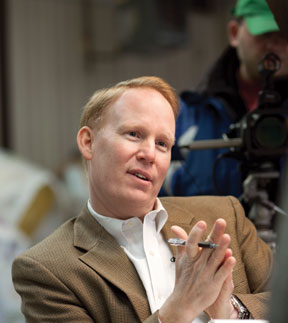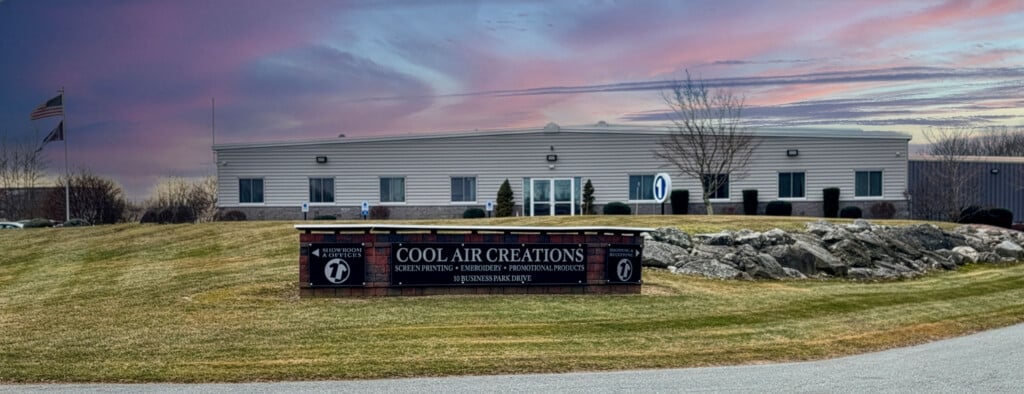Don’t Mess with Jim Hummel
Fed up with TV journalism, investigative reporter Jim Hummel took his act solo — and online. The Hummel Report has broken big stories and gotten people fired, and people often leave any room he enters. But can this new model succeed?

Hummel spent thirteen years as a Providence Journal reporter, and another thirteen as an investigative reporter for Channel 6 doing, among other things, “You Paid For It” segments. Now he’s on his own with The Hummel Report, a website devoted to uncovering government waste and corruption. The easy way he gets his story: public employees or elected officials come clean with him. The hard way: he shoves a camera, mic and evidence in their faces.
He seems to enjoy the latter. “I just had a question,” Hummel says in a report on a female worker at Colt State Park living rent free in a state-owned caretaker’s home. Her response is a curt “I’m not talking to you” before she hustles into a nearby car.
The department soon orders back rent paid and five DEM workers are disciplined.
Or consider The Hummel Report on conflicts of interest regarding the Block Island harbormaster. He asks the town manager about it and she politely says, “It’s nothing I want to talk about on camera because it involves a personnel issue.”
The harbormaster resigns several months later.
In another, Hummel breaks a story about Central Falls Mayor Charles Moreau getting a free furnace for his house from a contractor who does business with the city. He tries the hard way by ambushing the mayor at his car, but Moreau quickly pulls away. But later, the guy relents and they do it the easy way, in a taped sit-down interview. When our intrepid reporter asks about the furnace, Moreau says he paid the contractor $4,000 — in cash.
“Paid him cash,” Hummel intones, a bit surprised. “Do you usually pay people in cash?”
“Well,” Moreau answers, “the guy did the job, that’s what I paid him.”
A state-ordered receiver later demotes Moreau to an advisory position, taking over his duties. The Rhode Island Ethics Commission launches an investigation into the furnace issue, and the FBI and state police start probing corruption in Moreau’s administration. The Providence Journal and TV stations report on it, citing The Hummel Report.
The easy way or the hard way, Hummel appears to be getting results. And that’s his bottom line.
“I realize not every story has an impact,” Hummel says of the at least once-weekly, six-minute stories he’s done since founding the Report in October 2009. “But we’re at the point now that when we report something, people pay attention. It’s gratifying.”
The Hummel Report, a business awaiting non-profit certification, is actually a three-pronged reporting endeavor. Hummel also does shorter versions of the report on WPRO radio and longer written ones for Motif magazine. It came into being after Hummel left Channel 6.
His departure was prompted after Global Broadcasting bought the station and immediately hired former Providence mayor and convicted felon Buddy Cianci to do his own show.
“They needed to make money and took the sensational route,” Hummel says, his voice more than a little tinged with a note of disgust.
He’d always been proud of the product that Channel 6 turned out, a third-ranked station that Hummel says “was not third rate.” But after that, sensationalism led to iffy stories, he says, including one he claims was basically fabricated.
For a guy devoted to uncovering lies, it was too much.
“I didn’t know what to do and my wife, Wendy, said, ‘If you stay, they’ll drag you down,’ ” Hummel says. “I had twins, I was married, I had a mortgage, but I said, ‘I’m getting out.’ ”
He talked to the station general manager and told him he was leaving. When, the manager asked. “When this meeting is over,” Hummel said.
He had a three-month non-compete contract and figured he’d have ninety days to enjoy boating in Barrington, where he lives.
Three months turned into nearly a year and a half.
“It was September 2008, an economic meltdown,” he says. “I could have been Edward R. Murrow himself and not gotten hired by anyone.”
To avoid the appearance of being fired by the station, Hummel followed the advice of friend Dante Bellini, vice president of Providence communications agency RDW Group, and notified local TV and radio to say why he left. Then he began to think about how to stay in the business, feed his family and do what he loved.
“Dante and I had lunch in March 2009 and he texted me later and said, ‘I got it. Do what you do on the Internet. ’ ”
Hummel got together with Bill Felkner, founder of the non-profit watchdog agency Ocean State Policy Research Institute. A partnership was struck; The Hummel Report’s website has a database of public information and documents maintained and provided by OSPRI.
Hummel needed cash to kick off the venture, and turned to Cranston businessmen John Hazen White Jr., and Alan Hassenfeld, former leader of Hasbro. Hassenfeld found donors and White kicked in $30,000 seed money.
Hummel was up and running. The first report was October 2009, about a Woonsocket cop on disability for thirteen years, costing the city more than a million bucks.
“I think it took a lot of balls to do what Jim did,” Bellini says. “I told him that in my opinion, there was a great opportunity to fill something missing in the marketplace, to bring to bear his writing and investigative talents, but package it as TV on the Internet and radio.
“He’s done a really good job, he has a unique, old-school style,” Bellini says. “Is he always 100 percent? No. But he’s right more than he’s wrong, and that’s half the battle.”
The Hummel Report relies on public support, in part through The Hummel Club, which people can join for $96 annually and get exclusive access to production notes, early-story notifications, bloopers and Hummel Tweets. It also takes outright donations, giving rise to objectivity questions.
“We do not take donations from elected officials and I really don’t know who donates — Felkner handles it,” Hummel says. “I don’t want to be concerned about who we’re doing stories on. I’ve had politicians and retired politicians wanting to donate and we’ve said no.”
“The most important thing I told Jim is I do this with no strings attached,” Hassenfeld says. “You have a job to do and we have to make sure there’s separation. If you want to do a story that says I have two left feet, you do it. I want him to be independent and not beholden to anyone, not that he ever would be.”
“Absolutely none,” Felkner says about any influence he or others have on Hummel’s work. “I usually get notice on Tuesday about what he’s doing (new reports air Thursdays). There’s been concern about him hooking up with a guy who runs a think tank, but we made it clear, we’ll help his site but have nothing to do with
his stories.”
Understandably, not everyone loves Hummel, including former North Kingstown School Department Superintendent James Halley. When doing “You Paid For It,” Hummel found the school department used $10,000 of special education money to fund an administrative retreat for school officials that bought steak, lobster and booze. The Department of Education launched a probe and found the district guilty of misspending nearly a quarter of a million dollars, effectively forcing Halley’s buyout by the school board. The report won Hummel an Edward R. Murrow Award.
When confronting Halley one night, Hummel shoved his foot in a door to keep Halley from slamming it in his face. Halley claimed Hummel hit him and filed a report with police that was never substantiated.
“Jim Hummel covers his own perspective on things. I wonder why you’re highlighting him,” Halley says.When asked if the report was inaccurate, he answers, “Yes.”
“Basically he’s a yellow journalist, a muckraker,”
Halley says calmly. “He reports parts of things in ways that push his agenda. He smeared me and slandered me. I was a public official, so there was nothing I could do.” Did he sue Hummel — who claims he’s never been sued? Halley says, “No.”
Halley says Hummel “jumped in front of me and asked me to answer questions, and I said no, so he put his foot in the door,” which led to the assault allegation that police never pushed.
“Apparently, I assaulted him with the First Amendment,” Hummel says in response.
This may shock those who think Hummel knows so much about Rhode Island, he must be a native. He’s not, but he came here as a toddler in 1965. Born in LaGrange, Illinois, outside Chicago, Hummel moved to Barrington with his parents, both now deceased. His father, Charles E. Hummel, was working with the InterVarsity Christian Fellowship at the former Barrington College. He’s lived in town ever since, save for attending high school in Grafton, Massachusetts, when his dad took a job there, and then the University of North Carolina. He returned to Barrington in 1986. He never left again.
In high school, a teacher said the affable student was a good writer and a people person and should pursue journalism. He did, at UNC, where he majored in that and political science. He was elected editor-in-chief of The Daily Tar Heel, the university paper. But his greatest teacher was at home.
“My dad was a great writer, he was drilled in fundamentals and loved the craft of writing,” Hummel says of the man who wrote The Galileo Connection, a 1986 book linking science and Christianity. “He would gather up my school newspapers in his travels and grade them. His lesson was you’re always learning and if the day comes you think you’re God’s gift to writing, that’s the day you hang it up.”
Hummel applied to the Providence Journal. The day after he was elected editor-in-chief at UNC and had been up all night celebrating, the paper offered him a summer internship.
“I was all croaky,” Hummel says with a laugh. “They probably thought ‘Is this the guy we want to hire?’ ”
After graduating, he came back and started his career at the ProJo.
“I covered every meeting in the state, I learned the nuts and bolts of reporting, I learned budgets, government,” he says. “I got a four-year head start at UNC, but more than anything, I really learned at the Journal.”
He left in 1995 to take the Channel 6 job, which was risky, since “people said I could eventually retire at the Journal. I said that’s why I’m leaving. I don’t want to be covering the Warwick City Council in thirty years.”
He became a TV reporter and landed the “You Paid For It” gig, which had been dormant for years. Elwin Hart, then news director, gave the assignment to Hummel with orders that he take his time, uncover meaty stories and not worry about how often he could produce them as long as they had heft.
Hummel’s a long way from his old Barrington stomping grounds, including Barrington Middle School, which he attended and where his kids go now. He marvels at all the houses built around it since his time there. Which raises the question: If Barrington wrongdoing came up, what would he do?
“I don’t like doing stories in my own backyard, but if it’s juicy, we won’t ignore it,” he says. “I’m not seeking it out, and if it’s a real conflict, I wouldn’t do it. The flip side is the subject will be my wife’s second cousin’s father in law. Rhode Island is pretty small.”
Hummel and I drive past the house of his youth near the Carmelite Monastery.
As a kid, he got a kick out of seeing nuns, in full habit, on Barrington Beach, sometimes near pot-smoking college students. His neighborhood is the source of many warm childhood memories, most notably boating with his dad; one of Hummel’s proudest possessions is a photo on the wall in his basement work space of the two of them on their Pearson 26. Hummel has the boat now and sails with his family.
“My dad was a school administrator in the sixties — hard times, lots of stress. The boat was his escape,” Hummel says. “I guess it’s mine, too.”
Hummel could have tried a career move to Boston or New York, but stuck to Rhode Island to raise his twins, Alexandra and Cameron, now thirteen, with his wife. His schedule allows him to make their sporting events, see them off to school in the morning and just be there when they need him.
“When I was young, I said, ‘I’ll never sell my motorcycle, never go to Disney, and never have a minivan,’ ” he says with a laugh as he tools around in his Toyota Camry with a keychain bearing his kids’ photo. Wendy, who works in the radiology department at Rhode Island Hospital, has the minivan.
“Well,” he adds, “we had kids, and that all fell like dominoes.”
Hummel’s visual fear factor is pretty low. He’s slender, not terribly tall, and unassuming looking with a cherubic, ruddy face that belies his fifty-one years. He played hoops at Barrington Middle, mentored by math teacher and coach Scott Telford, now admissions director at St. Andrews.
“We used to call him Opie,” Telford says, referring to redheaded Ron Howard’s character from the old Andy Griffith show. “He had the same characteristics, bubbly personality.”
Hummel still has the red hair, albeit with a bald patch atop and, according to Telford, hasn’t changed much otherwise.
“He’s an undying optimist,” Telford says. “I remember him as an investigative reporter and thinking that fit his personality. He was going after unscrupulous people, but he’s more than upbeat about it.”
He’s the last guy you’d think you should be afraid of. But if you’ve done something wrong, or if Hummel thinks you have, be afraid — particularly if he’s holding a mic and accompanied by long-time friend and videographer Mike Rossi, who freelances for Hummel now after working with him at Channel 6.
“I’m proud of the work we’ve done, but a lot of times just seeing Jim scares people,” Rossi says. “They look, say ‘oh, shit,’ and they’re gone. I’m not kidding.”
At the Seaplane Diner on Allens Avenue, where Hummel and Rossi stop for coffee one morning — without camera or microphone — three city employees had just gotten their breakfast. One was about to take a bite, saw Hummel, then got up, tossed money on the table and left.
“The eggs were still hot,” Rossi says. “The guy probably didn’t do anything wrong. But that’s a burden for Hummel. People pass judgment and don’t know him. They know what they see on TV and think maybe he’s coming after them.”
Hummel’s mantra, Rossi says, “is if you didn’t do anything wrong, you’ve nothing to worry about. But if you did…”
Hummel is noted for ambushing subjects, but in reality, he says, he does so maybe two times out of every ten stories — only when the facts are on his side and he knows his victim will try lying his way out of it. The camera catches it all, every wince, every nervous look, every eye twitch. It makes for good video, and Hummel uses it.
“I realize I sometimes create that tension,” says Hummel. It means he sometimes gets shoved or even swung at, but he takes it in unapologetic stride. “I chalk it up to the nature of what I do.”
His on-air demeanor is strong, more methodical, slow, as when he appears on radio WPRO with John DePetro. Between live broadcasts, DePetro lauds Hummel, whom he had on daily when Hummel was reporting non-stop on Operation Plunderdome, the scandal that landed Cianci in prison.
“Hummel’s doing a great job, he’s the envy of local media,” DePetro says in a break. “We’re lucky to have someone like him; he’s someone usually found in a much larger market. He breaks news and others follow.”
These are not good times for the media. Print journalism is viewed as a communication dinosaur, and TV news departments are greatly reduced, leaving fewer reporters to air shorter, less substantive stories. Hummel hopes to ride the Internet wave to a long-lasting career doing what he loves.
What he’s doing is unusual, says Jim Taricani, long-time reporter for WJAR-TV, where Hummel had applied after leaving Channel 6 but found no work.
“It’s a really interesting model, and Jim’s the first one to do it around here,” Taricani says. “This way of doing investigative reporting outside a mainstream, traditional news organization is interesting and, for the most part, he’s made it work.”
Taricani, himself an award-winning investigative reporter, realizes Hummel’s connection to OSPRI raises objectivity questions but says, “There’s no evidence that Jim’s their messenger boy. He’s a professional, he wouldn’t do anything to ruin his reputation.”
In short, Taricani says, “Jim has broken good stories, he does good journalism. In the long run, we might see more of this than less.” The industry is changing, he adds. People like Tim White, Channel 12’s investigative reporter, and Taricani may be out of a network job at some point. “I don’t know how long it’ll last. And the public still likes investigative reporting.”
At a Rehoboth selectmen’s meeting one night Hummel is doing a story, one that would later scorch WPRO’s airwaves, about a local official who was allegedly found curled up one night in someone’s driveway in East Providence after attending a nearby function — apparently addled by a combination of drink and a prescription painkiller he’d taken earlier. Hummel talks to one selectman, trying to get answers, microphone in his face, Rossi leaning in with the camera.
Later another selectman, friendly to Hummel, at least on the surface, tells him, “There’s a lot going on in this town, but I just can’t talk about it right now.”
That doesn’t matter to Hummel. The easy way or the hard way, you get the feeling he’s going to find out.

























